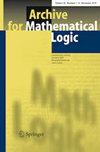An alternative proof of the Hilbert-style axiomatization for the \(\{\wedge ,\vee \}\)-fragment of classical propositional logic
IF 0.3
4区 数学
Q1 Arts and Humanities
引用次数: 0
Abstract
Dyrda and Prucnal gave a Hilbert-style axiomatization for the \(\{\wedge ,\vee \}\)-fragment of classical propositional logic. Their proof of completeness follows a different approach to the standard one proving the completeness of classical propositional logic. In this note, we present an alternative proof of Dyrda and Prucnal’s result following the standard arguments which prove the completeness of classical propositional logic.
经典命题逻辑$$\{\wedge ,\vee \}$$∧{,∨-片段的hilbert式公性的另一种证明}
Dyrda和Prucnal给出了经典命题逻辑\(\{\wedge ,\vee \}\)片段的hilbert式公理化。他们对完备性的证明采用了一种不同于证明经典命题逻辑完备性的标准方法。本文在证明经典命题逻辑完备性的标准论证之后,给出了Dyrda和Prucnal结果的另一种证明。
本文章由计算机程序翻译,如有差异,请以英文原文为准。
求助全文
约1分钟内获得全文
求助全文
来源期刊

Archive for Mathematical Logic
MATHEMATICS-LOGIC
CiteScore
0.80
自引率
0.00%
发文量
45
审稿时长
6-12 weeks
期刊介绍:
The journal publishes research papers and occasionally surveys or expositions on mathematical logic. Contributions are also welcomed from other related areas, such as theoretical computer science or philosophy, as long as the methods of mathematical logic play a significant role. The journal therefore addresses logicians and mathematicians, computer scientists, and philosophers who are interested in the applications of mathematical logic in their own field, as well as its interactions with other areas of research.
 求助内容:
求助内容: 应助结果提醒方式:
应助结果提醒方式:


